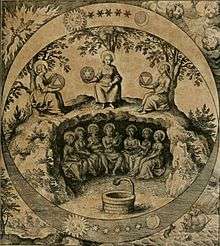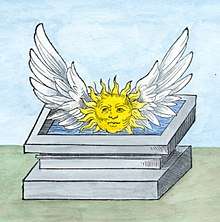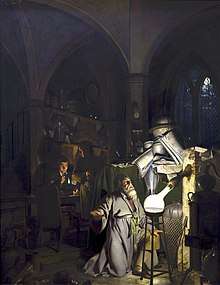Alchemy refers to a range of philosophies and ancient practices which seek to prepare or develop the "elixir of Life" or "immortality" or "longevity" using the philosophers' stone, accomplish the transmutation of base substances into gold, and attain ultimate wisdom. Many alchemical sources treat the various substances, equipment and processes used in alchemical workshops in an allegorical sense, as metaphors for a spiritual discipline. Alchemy, in its physical procedures and investigations can be viewed as a protoscience, the precursor to modern chemistry, having provided many procedures, equipment and names of substances which are still in use.
Quotes

- The Hindus do not pay particular attention to alchemy, but no nation is entirely free from it, and one nation has more bias for it than another, which must not be construed as proving intelligence or ignorance; for we find that many intelligent people are entirely given to alchemy, whilst ignorant people ridicule the art and its adepts.
- Alberuni, quoted from Lal, K. S. (1992). The legacy of Muslim rule in India. New Delhi: Aditya Prakashan. Chapter 1
- Alphonse: Humankind cannot gain anything without first giving something in return. To obtain, something of equal value must be lost. That is alchemy's first law of Equivalent Exchange. In those days, we really believed that to be the world's one, and only truth.
- Hiromu Arakawa, Fullmetal Alchemist, (2003)
- ... throughout his long life Newton continued to experiment in alchemy; indeed, he was, as Gleick writes, "the peerless alchemist of Europe". These studies in the dark art were conducted in deepest secrecy, and did not come to light until centuries after his death, when a large portion of his papers were reassembled. The economist John Maynard Keynes, the saviour of much of this documentation, was astonished by what he read. "Newton," Keynes told his students at Trinity, "was not the first of the age of reason. He was the last of the magicians."
- John Banville, (29 August 2003)"Review of Isaac Newton by James Gleick". The Guardian.
- The great libraries of Paris, Rome, Venice, Milan, Escurial, Cracow, Gotha, Munich, and Cologne preserve a large number of Greek alchemical manuscripts of unknown authorship and uncertain date. Hoefer... refers them to the third and fourth centuries, but other authorities with greater probability place them not earlier than the tenth and eleventh.
The most celebrated of these essays are attributed to Zosimus, of whose history nothing is certainly known, and bear these titles: "On Furnaces and Chemical Instruments," "On the Virtue and Composition of Waters," "On the Holy Water," "On the Sacred Art of Making Gold and Silver." In a treatise attributed to Synesius, we find a description of a hydroscopium or hydrometer which was re-discovered as long after as the sixteenth century.
In these manuscripts chemistry is called the "sacred Art," and the exceedingly obscure and figurative language in which they are written makes it well nigh impossible to separate fact from fancy; Hoefer has indeed attempted to discover modern chemical conceptions in the allusions to Egyptian myths and the chaotic collections of spagyric arcana. ...[E]ach author seems to have aimed to write treatises intelligible only to himself, and we greatly doubt his success in even this respect.- Henry Carrington Bolton, "An Address Delivered before the American Association for the Advancement of Science, at Montreal," (August 23, 1882) The Chemical News and Journal of Physical Science, p. 115, Vol. 46, No. 1190 (Sept. 15, 1882).
- What a lovely afternoon
On a cloudbusting kind of day.
We took our own 'Mystery Tour'
And got completely lost somewhere up in the hills.And we came up on a bee-keeper,
And he said "Did you know they can change it all?"
They got alchemy.
They turn the roses into gold
They turn the lilac into honey
They're making love for the peaches.And they'll do it,
Do it for you.- Kate Bush, in "You Want Alchemy" (B-side of "The Red Shoes" single) (4 April 1994)
- The matter lies before the eyes of all; everybody sees it, touches it, loves it, but knows it not. It is glorious and vile, precious and of small account, and is found everywhere... But, to be brief, our Matter has as many names as there are things in this world; that is why the foolish know it not.
- The Golden Tract concerning the Philosopher's Stone in the Musaeum Hermeticum
- Why should I use many words unto you? For this thing is extracted from thee, and thou art its ore; in thee they find it, and, to speak more plainly, from thee they take it; and when thou hast experienced this, the love and delight of it will be increased in thee. And thou shalt know that this thing subsists truly and beyond all doubt. … I have not known any Stone which might be likened to this Stone, or which may have the effect of it. For in this Stone the Four Elements are contained, and it is likened to the world and the composition of the world.
- "The Interrogations of King Calid, and the Answers of Morienus" in De Transmutatione Metallica
- The alchemical tradition assumes that every physical art or science is a body of knowledge which exists only because it is ensouled by invisible powers and processes. Physical chemistry, as it is practiced in the modern world, is concerned principally with pharmaceutical or industrial research projects. It is confined within the boundaries of an all-pervading materialism, which binds labor to the advancement of physical objectives.
- Manly Palmer Hall, in Meditation Symbols in Eastern and Western Mysticism
- It is a mistake to confound Alchemy with Chemistry. Modern Chemistry is a science which deals merely with the external forms in which the element of matter is manifesting itself. It never produces anything new. We may mix and compound and decompose two or more chemical bodies an unlimited number of times, and cause them to appear under various different forms, but at the end we will have no augmentation of substance, nor anything more than the combinations of the substances that have been employed at the beginning. Alchemy does not mix or compound anything, it causes that which already exists in a latent state to become active and grow. Alchemy is, therefore, more comparable to botany or agriculture than to Chemistry; and, in fact, the growth of a plant, a tree, or an animal is an alchemical process going on in the alchemical laboratory of nature, and performed by the great Alchemist, the power of God acting in nature.
- Franz Hartmann, in In the Pronaos of the Temple of Wisdom, containing the History of the True and the False Rosicrucians (1890), p. 129
- These are not fables. You will touch with your hands, you will see with your own eyes, the Azoth, the Mercury of Philosophers, which alone will suffice to obtain for you our Stone. … Darkness will appear on the face of the Abyss; Night, Saturn and the Antimony of the Sages will appear; blackness, and the raven's head of the alchemists, and all the colors of the world, will appear at the hour of conjunction; the rainbow also, and the peacock's tail. Finally, after the matter has passed from ashen-colored to white and yellow, you will see the Philosopher's Stone, our King and Dominator Supreme, issue forth from his glassy sepulcher to mount his bed or his throne in his glorified body... diaphanous as crystal; compact and most weighty, as easily fusible by fire as resin, as flowing as wax and more so than quicksilver … the color of saffron when powdered, but red as rubies when in an integral mass...
- Heinrich Khunrath, in Amphitheatrum
- The alchemical operation consisted essentially in separating the prima materia, the so-called chaos, into the active principle, the soul, and the passive principle, the body, which were then reunited in personified form in the coniunctio or 'chymical marriage'... the ritual cohabitation of Sol and Luna.
- Carl Jung, in Mysterium Coniunctionis
- Everyone knows Newton as the great scientist. Few remember that he spent half his life muddling with alchemy, looking for the philosopher's stone. That was the pebble by the seashore he really wanted to find.
- Fritz Leiber, in "Poor Superman" (1951), also in the anthology Tomorrow (1952) edited by Robert Heinlein
- If by fire
Of sooty coal th' empiric alchymist
Can turn, or holds it possible to turn,
Metals of drossiest ore to perfect gold.- John Milton, Paradise Lost (1667; 1674), Book V, line 439, reported in Hoyt's New Cyclopedia Of Practical Quotations (1922), p. 19
- Few would defend a small view of Alchemy as "Mother of Chemistry", and confuse its true goal with those external metal arts. Alchemy is an erotic science, involved in buried aspects of reality, aimed at purifying and transforming all being and matter. Not to suggest that material operations are ever abandoned. The adept holds to both the mystical and physical work.
- Jim Morrison, in The Lords and the New Creatures: Poems (1969), The Lords: Notes on Vision
- They can picture love affairs of chemicals and stars, a romance of stones, or the fertility of fire. Strange, fertile correspondences the alchemists sensed in unlikely orders of being. Between men and planets, plants and gestures, words and weather.
- Jim Morrison, in The Lords and the New Creatures: Poems (1969), The Lords: Notes on Vision
- Cinema returns us to anima, religion of matter, which gives each thing its special divinity and sees gods in all things and beings. Cinema, heir of alchemy, last of an erotic science.
- Jim Morrison, in The Lords and the New Creatures: Poems (1969), The Lords: Notes on Vision
- The starving chemist in his golden views
Supremely blest.- Alexander Pope, Essay on Man, Epistle II, line 269, reported in Hoyt's New Cyclopedia Of Practical Quotations (1922), p. 19
- Alchemists knew the coiled serpent as Uboros. ...it represented the highest goal of their quest: the harmonious union of opposites, especially the masculine and the feminine sides of the personality. The motto that usually accompanied it was "From the One to the One."
- Theodore Roszak, The Gendered Atom (1999)
- You are an alchemist; make gold of that.
- Timon in William Shakespeare, Timon of Athens (date uncertain, published 1623), Act V, scene 1, line 117
- I had discovered, early in my researches, that their doctrine was no mere chemical fantasy, but a philosophy they applied to the world, to the elements, and to man himself.
- William Butler Yeats, in Rosa Alchemica
- For me, I have seen worlds and people begin and end, actually and metaphorically, and it will always be the same. It’s always fire and water.
No matter what your scientific background, emotionally you’re an alchemist. You live in a world of liquids, solids, gases and heat-transfer effects that accompany their changes of state. These are the things you perceive, the things you feel. Whatever you know about their true natures is rafted on top of that. So, when it comes to the day-to-day sensations of living, from mixing a cup of coffee to flying a kite, you treat with the four ideal elements of the old philosophers: earth, air, fire, water.
Let’s face it, air isn’t very glamorous, no matter how you look at it. I mean, I’d hate to be without it, but it’s invisible and so long as it behaves itself it can be taken for granted and pretty much ignored. Earth? The trouble with earth is that it endures. Solid objects tend to persist with a monotonous regularity.
Not so fire and water, however. They’re formless, colorful, and they’re always doing something. While suggesting you repent, prophets very seldom predict the wrath of the gods in terms of landslides and hurricanes. No. Floods and fires are what you get for the rottenness of your ways. Primitive man was really on his way when he learned to kindle the one and had enough of the other nearby to put it out. It is coincidence that we’ve filled hells with fires and oceans with monsters? I don’t think so. Both principles are mobile, which is generally a sign of life. Both are mysterious and possess the power to hurt or kill. It is no wonder that intelligent creatures the universe over have reacted to them in a similar fashion. It is the alchemical response.- Roger Zelazny, Isle of the Dead (1969), Chapter 6
See also
External links
- SHAC: Society for the History of Alchemy and Chemistry
- ESSWE: European Society for the Study of Western Esotericism
- Association for the Study of Esotericism
- The Alchemy Website · Adam McLean's online collections and academic discussion
- Dictionary of the History of Ideas: Alchemy
- Book of Secrets: Alchemy and the European Imagination, 1500-2000 · A digital exhibition from the Beinecke Rare Book and Manuscript Library at Yale University



